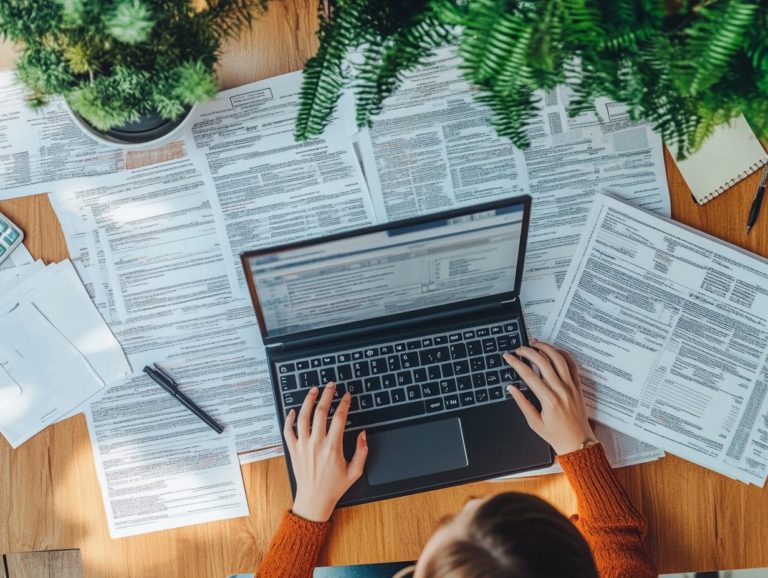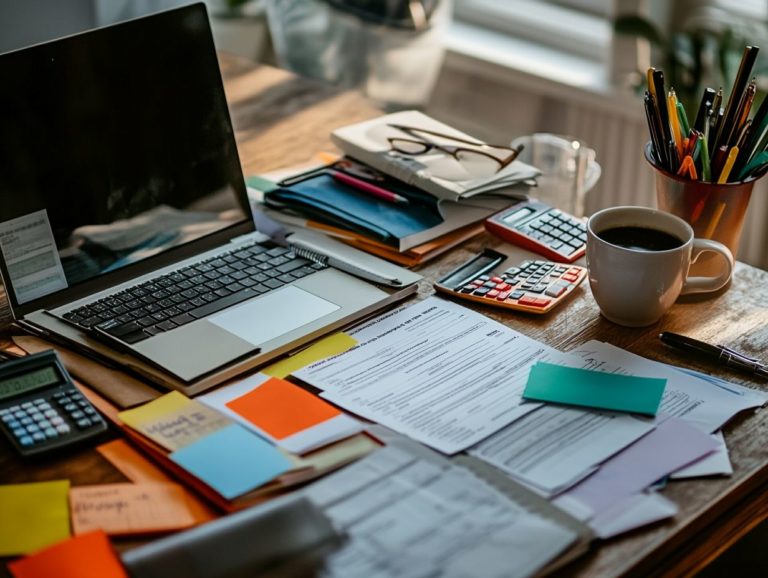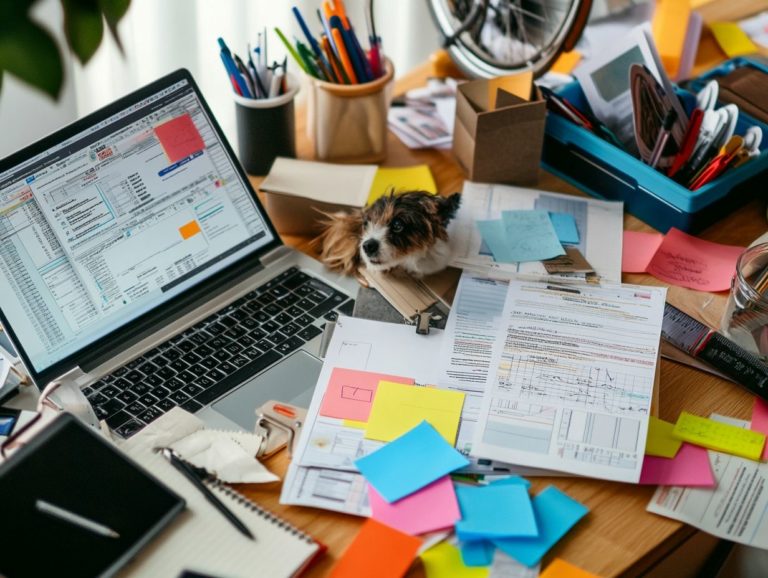Freelancers and Depreciation: What You Should Know
Freelancers frequently find themselves balancing a myriad of responsibilities. Yet, grasping the concept of depreciation should be at the forefront of your priorities, especially when considering various income streams.
This article delves into the essentials of depreciation what it is, why it deserves your attention, and how it can significantly affect your financial landscape, particularly in the gig economy.
You’ll discover various methods for calculating depreciation, understand the tax implications, and learn how to maximize your tax deductions effectively, including through Section 179.
Whether you re a seasoned freelancer or just embarking on your journey, this guide equips you with the knowledge necessary for making informed financial decisions, optimizing your tax benefits, and navigating the complexities of self-employment tax.
Contents
- Key Takeaways:
- Understanding Depreciation for Freelancers
- Depreciation Methods for Freelancers
- Depreciation and Taxes for Freelancers
- Calculating Depreciation for Freelancers
- Maximizing Depreciation for Freelancers
- Frequently Asked Questions
- What is depreciation and why is it important for freelancers to know about?
- How does depreciation affect my business expenses as a freelancer?
- What is the difference between straight-line depreciation and accelerated depreciation?
- As a freelancer, what assets can I depreciate?
- Do I need to consult a tax professional for help with depreciation?
- Can I claim depreciation on assets that I use for personal and business purposes?
Key Takeaways:

- Depreciation can help freelancers save money on taxes by reducing their taxable income and improving their overall tax compliance.
- There are three main methods of calculating depreciation: straight-line, declining balance, and units of production, which freelancers should understand to optimize their business expenses.
- Freelancers should consider factors such as asset lifespan, salvage value, and associated car costs when calculating depreciation, and utilize tools like TurboTax and Cash App Taxes for accurate calculations.
Understanding Depreciation for Freelancers
Depreciation is an essential concept for freelancers, especially as you navigate the complexities of tax compliance and financial management. Grasping how depreciation applies to your various assets can empower you to strategize your tax planning with finesse.
It involves systematically reducing the value of your assets over time. This not only affects your tax liabilities but also shapes your overall financial landscape. Leveraging tools like TurboTax can simplify this process for you, ensuring you maximize your tax deductions, particularly in the dynamic gig economy.
What is Depreciation?
Depreciation is the accounting method you ll use to allocate the cost of a tangible asset over its useful life. This captures that gradual decrease in value as it ages or gets put to work in your business operations.
This process is vital for effective financial management, especially for freelancers who must meticulously account for their business expenses. By understanding depreciation, you can see how assets like office supplies, computers, and furniture diminish in value over time. This leads to more informed budgeting decisions. Additionally, it’s important for freelancers to be aware of their retirement contributions; knowing how to manage this aspect can be crucial. Check out freelancers and retirement contributions to help navigate these financial waters. Often, these depreciated values can be claimed as tax deductions, ultimately lowering your taxable income.
For example, if you invest in a high-quality camera for your photography business, you have the opportunity to deduct a portion of its cost each year. This mirrors its declining value, significantly enhancing your financial strategy.
Depreciation Methods for Freelancers
As a freelancer, you have the flexibility to select from various depreciation methods tailored to your business needs. You might opt for the Straight-Line Method for its simplicity, the Declining Balance Method for accelerated deductions, or the Units of Production Method if your asset usage varies.
Each approach offers distinct advantages and implications. These can significantly impact your tax deductions and overall financial goals. Choose wisely to maximize your benefits.
Straight-Line Method
The Straight-Line Method of depreciation stands out as the simplest and most widely embraced approach. Here, the cost of an asset is evenly distributed over its useful life, giving you a clear path to predict your annual tax deductions with ease.
This method offers you a straightforward perspective on your finances. Determining your annual depreciation amount only requires some basic arithmetic. For instance, if you invest $2,000 in a computer with an estimated useful life of five years, you can effortlessly figure out a depreciation expense of $400 each year. This simplicity not only streamlines your record-keeping but also enhances your financial strategy by allowing you to anticipate expenses with greater accuracy.
Assets like office furniture and equipment commonly benefit from this method. This enables you to grasp potential tax deductions and refine your overall financial management.
Declining Balance Method

Get ready to maximize your savings! The Declining Balance Method allows you to accelerate depreciation, enabling you to deduct more in the early years of an asset’s life. This can be particularly advantageous for managing your cash flow and tax liabilities.
Essentially, this method applies a constant depreciation rate to the diminishing book value of the asset each year. You multiply the remaining value of the asset by a fixed percentage, typically double the straight-line rate. This results in larger deductions upfront.
This strategy is especially beneficial for costly equipment or technology. It helps reduce your taxable income sooner and boosts your cash flow during crucial growth phases.
Grasping the implications of this method can pave the way for strategic planning regarding future investments and effective asset management. By doing so, you can optimize your resources while efficiently navigating your tax obligations.
Units of Production Method
The Units of Production Method connects depreciation to actual usage rather than a fixed timeframe. This makes it particularly beneficial for freelancers whose expenses vary with the volume of work completed or output generated.
This approach empowers professionals across diverse fields whether you’re in graphic design, photography, or content creation. You can allocate costs to specific projects based on tangible work accomplished. As a result, it significantly enhances your financial planning and offers a clearer perspective on profit margins linked to each project.
By monitoring expenses in relation to production levels, you can unlock valuable insights into your resource utilization. This is essential for maintaining a healthy cash flow. This deeper understanding ultimately supports you in making informed decisions about budgeting and forecasting future expenses.
Depreciation and Taxes for Freelancers
Grasping the intricate relationship between depreciation and taxes is essential for freelancers. By accurately accounting for depreciation, you can substantially decrease your overall tax liability and fully leverage available tax deductions.
This understanding enhances your financial skills and empowers you to make informed decisions that optimize your tax strategy.
How Depreciation Affects Taxes
Depreciation plays a crucial role in shaping your taxable income as a freelancer. It effectively lowers your taxable income and influences the amount of tax you owe. This also helps you keep your taxes in order when preparing them and ensures accurate bookkeeping.
When you factor in the depreciation of your assets like computers and office furniture, you’re strategically decreasing your income subject to taxation. For example, if you buy a laptop for $1,000 and opt for a straight-line depreciation method (a way to spread the cost evenly over an asset’s useful life) over five years, you can deduct $200 from your taxable income each year. Additionally, understanding insurance for freelancers is crucial for protecting your investments and ensuring financial stability.
This reduction lowers your tax load and boosts your finances. Accurate bookkeeping is essential in this endeavor, ensuring that you accurately record depreciation and maintain compliance with tax regulations.
This diligence provides a clear picture of your financial standing and demonstrates your commitment to adhering to tax regulations.
Tax Deductions for Depreciation
As a freelancer, you can strategically leverage depreciation as a tax deduction to offset your income. This is essential for effective financial management and maximizing the tax breaks that the IRS allows.
By familiarizing yourself with the various types of depreciable assets such as office equipment, computers, and vehicles used for business purposes you’ll be well-equipped to take full advantage of these financial benefits.
Typically, assets with a useful life of more than one year can be depreciated. This enables you to deduct a portion of their costs from your income each year.
Claiming these deductions requires completing the appropriate forms on your tax returns. It s crucial to maintain detailed records of each asset. This process highlights the importance of meticulous bookkeeping.
Accurately tracking eligible deductions supports your claims and provides you with a clearer understanding of your overall financial health.
Calculating Depreciation for Freelancers

Accurately calculating depreciation is crucial for freelancers. It helps you manage tax compliance while optimizing your financial accounts.
Whether you’re using tax software or consulting with a CPA, getting this right can significantly impact your financial well-being.
Factors to Consider
When calculating depreciation, consider several key factors. These include the asset’s useful life, purchase price, and any potential tax strategies that can optimize deductions.
The type of asset you hold is crucial, as different categories such as vehicles, equipment, and technology have their own depreciation methods and timelines. Don’t overlook usage patterns; assets used frequently may depreciate more quickly than those that sit idle.
Market conditions also influence depreciation rates and how much an asset’s value declines over time. Understanding these dynamics helps you create better tax strategies, including knowing what every freelancer should know about taxes. This ensures compliance with regulations and boosts your financial management.
Tools and Resources for Calculating Depreciation
Freelancers can take advantage of various tools to simplify the task of calculating depreciation. Platforms like TurboTax and Cash App Taxes are designed with your needs in mind.
These tools allow you to easily input asset details while automating depreciation calculations. This can alleviate the stress of tax season.
Choosing the right tools is essential for maintaining compliance with tax regulations and maximizing deductions. With the right resources, you ensure accurate financial management and gain valuable insights to empower your business decisions.
Maximizing Depreciation for Freelancers
Freelancers have the opportunity to maximize depreciation. This can significantly enhance their tax benefits through effective tax strategies that adhere to IRS guidelines.
By doing so, you can elevate your overall financial performance and management practices.
Tips for Maximizing Tax Benefits
To maximize your tax benefits, implement proactive strategies. This includes careful tracking of expenses, timely asset purchases, and leveraging available deductions.
Regularly reviewing your financial accounts can reveal hidden savings opportunities. Schedule quarterly assessments to identify patterns in your income and spending for more precise budgeting.
Creating a strategic plan that aligns with your tax strategies ensures you utilize every potential deduction. This includes home office costs and business travel.
Engaging with tax professionals can further elevate this process. They provide insights into overlooked opportunities, enhancing your financial well-being.
Frequently Asked Questions

What is depreciation and why is it important for freelancers to know about?
Depreciation is the decrease in value of an asset over time due to wear and tear, obsolescence, or other factors. It is important for freelancers to understand depreciation because it can affect their business expenses and taxes.
Obsolescence is the process by which an asset becomes outdated or no longer useful.
How does depreciation affect my business expenses as a freelancer?
When you buy a depreciating asset for your business like a laptop or camera you can deduct part of its cost each year. This reduces your taxable income and helps you save on taxes.
What is the difference between straight-line depreciation and accelerated depreciation?
Straight-line depreciation means you deduct the same amount from the asset’s value every year. Accelerated depreciation lets you take larger deductions earlier, with smaller ones later.
As a freelancer, what assets can I depreciate?
Freelancers can depreciate assets used for business, including equipment, furniture, software, and vehicles. Keep track of these assets and their values for accurate depreciation calculations.
Do I need to consult a tax professional for help with depreciation?
It s not required, but consulting a tax professional can be a game-changer for freelancers. They can help you calculate depreciation correctly and ensure you follow all tax laws.
Can I claim depreciation on assets that I use for personal and business purposes?
Yes! If you use an asset for both personal and business purposes, you can only claim depreciation on the business portion. Keep detailed records to accurately calculate business usage.






